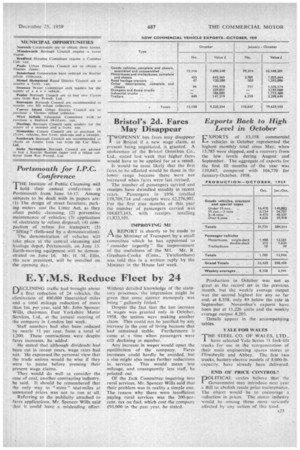E.Y.M.S. Reduce Fleet by 24
Page 25

If you've noticed an error in this article please click here to report it so we can fix it.
nECLINING traffic had brought about
a fleet reduction of 24 vehicles, the elimination of 400.000 timetabled miles and a total mileage reduction of more than 1m. per year, said Mr. John Spencer Wills. chairman. East Yorkshire Motor Services, Ltd.. at the annual meeting of the company in London last week.
Staff numbers had also been reduced by nearly Ii per cent. from a total of 1.200. These contractions were despite fares increases, he added.
He stated that although dividends had. been cut in recent years, wage rates had not. He expressed the personal view that the trade unions would be wise if they were to Pause before pressing their present wage claims.
They would do well to consider the case of coal, another contracting industry. he said. it should be remembered that the only way to "store" seat-miles at unwanted prices was not to run at ail.
Referring to the publicity attached to fares applications, Mr. Spencer Wills said that it could have a misleading effect. Without detailed knowledge of the statutory processes, the impression might be given that sonic sinister monopoly was being "gallantly foiled."
Despite the fact that the last increase in wages was granted only in October, 1958, the unions were making another claim. This could not be justified by any increase in the cost of living because that had remained stable. Furthermore it came at a time when passengers were still declining in number.
Any increase in wages would upset the equilibrium of the company. Fares increases could hardly be avoided, but a rise might also mean further reductions in services. This would mean less mileage, and consequently less staff, he pointed out.
Of the Jack Committee inquiring into rural services. Mr. Spencer Wills said that their problem was in reality a simple one. The reason why there were insufficient paying rural services was the 200-percent. tax on fuel, which cost the company £91,000 in the past year, he stated.
















































































